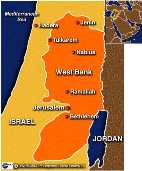Jerusalem's mayoral race: From high-tech to green leaf
 Jerusalem - Take a successful high-tech entrepreneur. Add the scion of a prominent ultra-Orthodox family. Throw in a Russian billionaire who barely speaks Hebrew, and a pub owner whose campaign symbol is a marijuana leaf. Welcome to the Jerusalem mayoral contest.
Jerusalem - Take a successful high-tech entrepreneur. Add the scion of a prominent ultra-Orthodox family. Throw in a Russian billionaire who barely speaks Hebrew, and a pub owner whose campaign symbol is a marijuana leaf. Welcome to the Jerusalem mayoral contest.
Israelis vote Wednesday in municipal elections, and the contest in Jerusalem is attracting particular attention this year, in part because of the unique status of the city which Israeli regards as its capital, but which, despite being the most-populated in the country - some 733,000 residents - is also one of the poorest.
Poverty is not the least of Jerusalem's problems even if the average wage in the city is about 256 dollars lower than the national average.
The city is also plagued by a high cost of housing (higher than the national average for both rentals and sales), unemployment and a diminishing secular Jewish middle class.
With problems such as these, it is a wonder anyone wants to be mayor of the city, but the leading candidates in the race are all convinced they can supply the answers to its problems.
Entrepreneur Nir Barkat, 49, who describes himself as the secular candidate, is promising to use his not inconsiderable business acumen to to make housing more affordable, promote job creation and alleviate poverty. He narrowly lost the 2003 mayoral race and has served as the head of the "opposition" on the city council.
Opposing him is Meir Porush, 54, like his father before him a former deputy minister in the Israeli government.
He can count on the ultra-Orthodox vote, but is also aiming at the secular residents by promising to fix the city's central problems and revive its cultural and artistic character. "Jerusalem will love Porush" is his campaign slogan.
He also wants to attract 10,000 new residents, religious and secular, to a city which since 1988 has suffered negative population growth, mainly of secular Jews who fear what they see as the creeping "ultra-Orthodoxation" of their city.
The third major candidate, Arkady Gaydamak, 56, is running on a slogan of "he doesn't talk, he does," possibly, some observers have noted cynically, because his lack of Hebrew doesn't allow him to talk at length.
A controversial figure, the Russian-born billionaire has been living in Israel since the early years of the decade, after an international arrest warrant was issued against him in connection with an arms-dealing scandal.
He owns several newspapers in Russia and France and, crucially for his mayoral aspirations, also owns Betar Jerusalem, one of Israel's leading football clubs, and certainly its most passionately supported.
Gaydamak is campaigning on a platform of equal opportunities and non-partisanship, and is especially targeting East Jerusalem Palestinians, but if he hopes to get their votes he'll have his work cut out for him.
The Palestinian Authority has called on Arab residents of East Jerusalem to boycott the elections, fearing that to vote in them would be seen as confirming Israeli control over a city they want as the capital of their future state.
But Gaydamak hopes his promise, delivered with a strong Russian accent, of a "paradise" will convince them to support him in the belief he will overturn the years of neglect East Jerusalem's Palestinian neighbourhoods have received from successive mayors.
Dan Birron, 68, is a newcomer to the race, representing the Green Leaf party, best known for advocating the legalization of marijuana. The shaggy-haired former television producer will likely not win many votes, although he has at least gained free publicity for his downtown pub.
Polls give Barkat the edge in the race, but whereas secular Israelis are noticeably apathetic when it comes to municipal elections, Porush can count on ultra-Orthodox rabbis telling their flock to vote.
Of all the previous mayors in Jerusalem, the most famous without a doubt was Teddy Kollek, a Hungarian-born, Vienna-raised former civil servant, and one of the people to whom Arthur Koestler dedicated his 1945 novel Thieves in the Night.
In his 28-year stint (1965-1993) at city hall, the expansive Kollek turned Jerusalem almost into his own personal fiefdom, with a legendary style of doing things, from cat-napping between, and even during, meetings, to once stopping his official car to berate a bewildered tourist who dared to pick a flower from a municipal garden.
None of his successors, including a savvy politician named Ehud Olmert, who made a 10-year stopover at city hall on a political journey which ended at the prime minister's office, or Uri Lupoliansky, Jerusalem's first ultra-Orthodox mayor, who is not running for a second term, managed to emulate Kollek's panache.
"It is sad to be mayor of Jerusalem," wrote Israeli poet Yehuda Amichai. "It is terrible. How can anyone be the mayor of a city like that?"
Come November 11, one of the Jerusalem's four mayoral contenders will get the chance to discover whether Amichai was on the mark. (dpa)